 Petzlover
Petzlover Boykin Spaniel is originated from United States but Sakhalin Husky is originated from Japan. Boykin Spaniel may grow 20 cm / 7 inches shorter than Sakhalin Husky. Boykin Spaniel may weigh 22 kg / 48 pounds lesser than Sakhalin Husky. Both Boykin Spaniel and Sakhalin Husky has almost same life span. Both Boykin Spaniel and Sakhalin Husky has almost same litter size. Both Boykin Spaniel and Sakhalin Husky requires Moderate Maintenance.
Boykin Spaniel is originated from United States but Sakhalin Husky is originated from Japan. Boykin Spaniel may grow 20 cm / 7 inches shorter than Sakhalin Husky. Boykin Spaniel may weigh 22 kg / 48 pounds lesser than Sakhalin Husky. Both Boykin Spaniel and Sakhalin Husky has almost same life span. Both Boykin Spaniel and Sakhalin Husky has almost same litter size. Both Boykin Spaniel and Sakhalin Husky requires Moderate Maintenance.
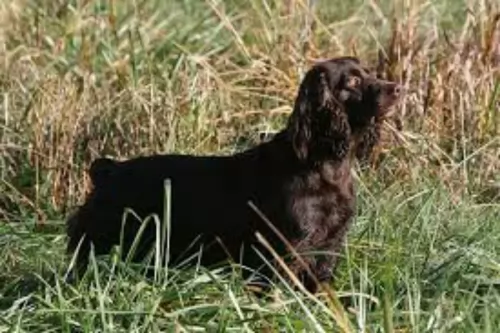 The Boykin Spaniel was originally bred by South Carolina hunters as the perfect dog for hunting wild bird during the early 1900s. Alexander White of Spartanburg found a short, well built dog and named him Dumpy. The dog was given to a certain L. Whitaker Boykin and a similar dog in looks was found and mated with Dumpy on Boykin’s Pine Grove plantation. Whitaker Boykin was particularly looking for a special kind of hunting dog breed that could wade into swamplands and into water.
The Boykin Spaniel was originally bred by South Carolina hunters as the perfect dog for hunting wild bird during the early 1900s. Alexander White of Spartanburg found a short, well built dog and named him Dumpy. The dog was given to a certain L. Whitaker Boykin and a similar dog in looks was found and mated with Dumpy on Boykin’s Pine Grove plantation. Whitaker Boykin was particularly looking for a special kind of hunting dog breed that could wade into swamplands and into water.
Boykin’s spaniels were popular in South Carolina before World War II and later, in 1977, the Boykin Spaniel Society was founded to ensure the breeding standards of the dog. In 1985, the Boykin Spaniel was declared the state dog of South Carolina and recognized by the American Kennel Club in 2009.
 Known also as the Karafuto-Ken, the Sakhalin Husky is a dog that has been used as a sled dog, but which is now almost extinct.
Known also as the Karafuto-Ken, the Sakhalin Husky is a dog that has been used as a sled dog, but which is now almost extinct.
Hailing from Japan, it is believed that in 2011, there were only two surviving members of the breed in Japan. There isn’t much history on these dogs, but we do know that it is an old breed. They've been used by explorers to the South Pole. One such explorer was Robert Falcon Scott.
They’re extremely tough dogs, known for enduring in the snow under extreme conditions. The dog breed isn’t recognized as a standardized breed by any of the major kennel clubs.
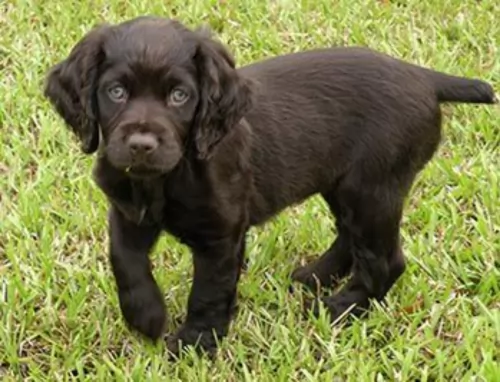 You can’t miss the medium-sized Boykin Spaniel with his magnificent coat in different shades of brown. When he gleams in the sun he looks like chocolate. This type of Spaniel is a bit bigger than the English Cocker Spaniel, but he is heavier, weighing between 13 to 18kg. He has large, floppy feathery ears and the tail has always been docked to give him that distinct look, but now with rules and regulations, the tail is often left so that it is long and feathery. The height of this dog at the withers is 39 to 43cm.
You can’t miss the medium-sized Boykin Spaniel with his magnificent coat in different shades of brown. When he gleams in the sun he looks like chocolate. This type of Spaniel is a bit bigger than the English Cocker Spaniel, but he is heavier, weighing between 13 to 18kg. He has large, floppy feathery ears and the tail has always been docked to give him that distinct look, but now with rules and regulations, the tail is often left so that it is long and feathery. The height of this dog at the withers is 39 to 43cm.
The length of the dog’s coat varies somewhat because of the different breeds from the past. Essentially the coat is medium length and wavy to curly with light feathering around the legs, ears, chest and stomach.
The Boykin Spaniel is social and he makes an excellent family pet. He is good around children and other dogs, and with training and socialization he becomes even more amicable and obedient.
 This is a medium sized dog standing at between 56 and 66cm in height and weighing between 30 and 40kg. His coat is thick and can be in a number of colours such as brown, tan, cream, grey or black. The ears are small and pointed and slightly tilted forwards. The tail is long and sometimes curls over the back while at other times it is held straight or down.
This is a medium sized dog standing at between 56 and 66cm in height and weighing between 30 and 40kg. His coat is thick and can be in a number of colours such as brown, tan, cream, grey or black. The ears are small and pointed and slightly tilted forwards. The tail is long and sometimes curls over the back while at other times it is held straight or down.
These dogs are known for their loyalty, affection and bravery. The dog is highly intelligent and will respond well to training and socialization.
It's a rare dog breed, calm and confident. A perfect example of their amazing characteristics is seen in the film ‘Eight Below’ where these wonderful dogs were left behind on a scientific expedition that went wrong.
The dogs had to struggle for survival in the frozen wilderness. The Sakhalin Husky just wants to please, and is alert and intelligent, doing well in a family where there are children.
Statues have been erected to honor these Sakhalin Huskies who died on some of these ill-fated expeditions.
These dogs are totally devoted to their owners and they’re full of confidence, they’ve got immense strength and they need a lot of physical stimulation every day.
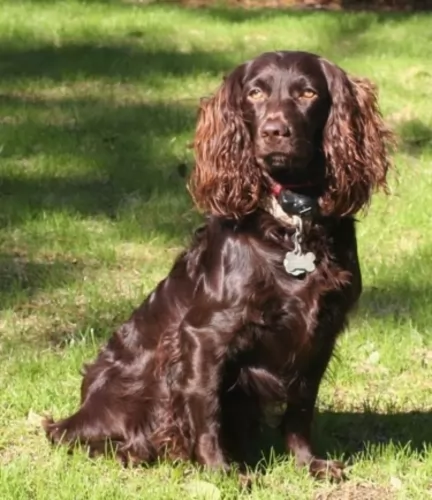 The Boykin Spaniel is a diverse breed. The characteristics of the dog aren’t set in stone. He is a hunting dogs with boundless energy and enthusiasm. He is an intelligent breed and responds well to training and is obedient to your commands. He is all about fun and excitement and he is guaranteed to make a splendid companion.
The Boykin Spaniel is a diverse breed. The characteristics of the dog aren’t set in stone. He is a hunting dogs with boundless energy and enthusiasm. He is an intelligent breed and responds well to training and is obedient to your commands. He is all about fun and excitement and he is guaranteed to make a splendid companion.
Active and social, he is going to need input from his owners in terms of exercise and mental stimulation. He isn’t a dog to just ignore and in exchange for love and care, he is going to be a loving, loyal and fun companion for you.
 When you bring these dogs into your home, you’re bringing in lots of excellent characteristics.
When you bring these dogs into your home, you’re bringing in lots of excellent characteristics.
He is loyal, affectionate and smart. With his above average intelligence, you can easily train him. He is also a playful breed and the kids will enjoy him as a good playmate.
They’re gentle dogs too and will do well in a home where people are fair, patient, kind and consistent with their handling of him. Known to be an excellent therapy dog, having this dog in your home will enhance your quality of life.
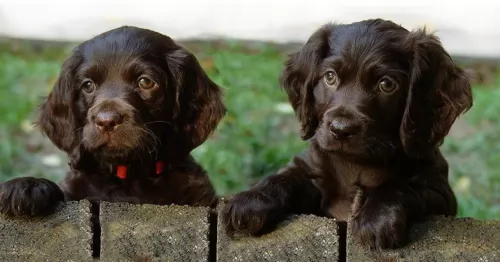 The Boykin Spaniel is a healthy breed with a life span of 14 to 16 years. There are some diseases that you want to be aware of with your Boykin Spaniel.
The Boykin Spaniel is a healthy breed with a life span of 14 to 16 years. There are some diseases that you want to be aware of with your Boykin Spaniel.
Always be aware of Hip Dysplasia as it can reduce your pet’s quality of life.. In dogs with hip dysplasia, the hip joint doesn’t to develop properly and deterioration sets in and your pet can lose function of the joint. You’ll notice your pet battling to stand up after lying down. The frightening this is that some dogs begin to show signs of hip dysplasia as early as 4 months of age.
The Boykin Spaniel’s most common health problems apart from hip dysplasia are patellar luxation and juvenile cataracts.
 The brave Sakhalin Husky can live to be between 12 and 14 years of age but these dogs can succumb to quite a few of the common dog diseases there are -
The brave Sakhalin Husky can live to be between 12 and 14 years of age but these dogs can succumb to quite a few of the common dog diseases there are -
This is a hereditary disease of the cornea. You’ll see small white dots in his cornea and the dog can experience hazy vision.
This problem with the hips can be debilitating for your sled dog, and both hips can be affected. It can be painful for your dog as arthritis sets in. It is important to see that your dogs don’t put on weight as this puts pressure on the joints. Your dog will need to see the vet, and surgery might be a treatment option.
This is a condition that affects Huskies between 3 and 4 months of age and can result in hair loss or problems with the skin. It is actually fairly rare in dogs and diagnosed by microscopic examination of the hair shaft. You will need to get your pet to the vet because it can lead to alopecia.
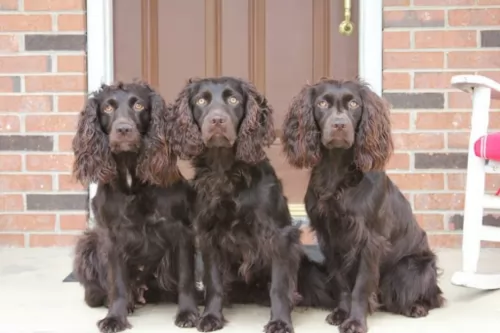 The Boykin Spaniel has been a gun dog and because he is energetic, he will need plenty of exercise and activities. Take him for walks or allow him to swim in the farm dam if you live in the country. He isn’t a dog to leave on his own in your backyard as he needs exercise as well as mental stimulation to keep him from becoming frustrated and developing destructive habits.
The Boykin Spaniel has been a gun dog and because he is energetic, he will need plenty of exercise and activities. Take him for walks or allow him to swim in the farm dam if you live in the country. He isn’t a dog to leave on his own in your backyard as he needs exercise as well as mental stimulation to keep him from becoming frustrated and developing destructive habits.
The Boykin’s hair will need to be brushed as least twice a week to prevent it from matting, particularly if he is a country-living dog, in and out of water and running through long grass. He is not a heavy shedder but his shedding is seasonal. As a long eared dog, he will need to have his ears checked to prevent infection.
Other grooming habits to get used to with your Boykin Spaniel are having his nails trimmed and brushing his teeth at least 2 or 3 times a week with special dog toothpaste and brush.
Boykin Spaniel owners who know the breed well say that there is nothing better than feeding your dog raw meat with vegetables and rice. Of course, not everyone can afford to feed their pets raw meat every day, and that’s alright. Just make sure that every now and then you include raw meat into your pet’s diet.
The very best commercially produced dog foods can also be good for your pet. If in doubt, speak to your veterinarian about the best food for your active, energetic pet. Never, ever deprive your pet of fresh, cool water throughout the day and night.
 Feed your Sakhalin Husky a commercially manufactured dog formula that caters to his energy and digestive needs.
Feed your Sakhalin Husky a commercially manufactured dog formula that caters to his energy and digestive needs.
Choose high-quality dog food with natural ingredients. Try and include some home-made food into your dogs diet. Boiled chicken, brown rice or pasta, sweet potatoes, carrots and spinach will do him wonders and you can chop it up and add some into the dry kibble as a treat twice a week.
Some raw meat occasionally is also important to prevent skin problems. Be sure that cool, fresh water is available for your pet at all times.
This will require regular exercise. Walks are always good, but he will require something more hectic such as long hikes and frisbee or ball throwing games.
A Husky’s dense double-coat must be brushed at least twice a week as he is a fairly heavy shedder.
His nails grow quickly and these will need to be trimmed. Even though he has erect ears, you will need to check inside for cleanliness to avoid canine ear infections.
Check inside his mouth as well for bad teeth as these can have a detrimental affect on his health